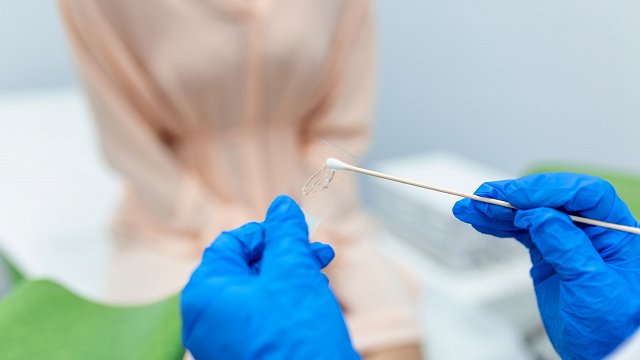Regular health checks can prevent or solve health issues early on. Still, many wait too long to see a specialist.
In 2022, the Disease Prevention and Control Center (SPKC) carried out a study on Latvian health habits. The study showed that men go to the doctor less frequently than women do.
According to calculations by the National Health Service (NVD), 299,726 people have not visited a general practitioner in the past three years. Because the data is selected automatically, this number also includes children born this year, which is a small fraction. Another small fraction could be people who live abroad but have not officially recorded the fact.
In the SPKC study, less than a fifth of those surveyed aged 15-74 replied that they had not visited the general practitioner at all in the past year; the most common response (47.4%) was that people visited the general practitioner 1-2 times over the past year. The general practitioner was not visited at all by 27% of men and 11.8% of women.
Men have also visited specialist doctors less often than women. 10.4% of women responded that they visited such specialists 5 times or more in the past year, while 5.1% of men said so. 55.6% of men and 31.9% of women did not go to specialist doctors at all. 30.5 percent of men and 41.2 percent of women attended specialists 1 to 2 times over the past year, and 3-4 times 8.8 percent and 16.4 percent, respectively.
Data from the Central Statistical Bureau (CSB) also show that men visit doctors less frequently – in 2022, 70.3% of men and 83% of women had visited a general practitioner at least once, while at least once, 36.9% of men and 48.8% of women had consulted a specialist during the year, respectively.
Some do not go to the doctor even when there is a need or symptoms.
In 2022, 8 percent of men and 10.9 percent of women said they had skipped a medical examination or treatment, although there has been such a need. 23.7 percent of men and 25.5 percent of women did not get checked out because they could not afford it, according to CSB figures. The second most significant reason for not visiting the doctor was the excessively long queues for admission to specialists – 23.9% of men and 29% of women did not visit the doctor for this reason. Not going to see a doctor because they wanted to wait and see if they got better in time was indicated by 18.8 percent of men and 11.5 percent of women.
The study looks separately at reasons why Latvian residents do not carry out state-paid cancer preventive tests. The main reasons for not carrying out such tests are both the lack of information about prevention and the screening program, the reluctance to check, and the lack of complaints.
Men are subject to bowel and prostate cancer screenings. These are organized by general practitioners. In order to carry out checks, a person must actively approach the practice of the general practitioner himself in order to receive a referral. That's why visiting GPs also plays a key role.
Bowel cancer, or colorectal cancer, is a malignant disease that develops in the cells that make up the gut wall. Women and men after the age of 50 are most likely to suffer from bowel cancer in Latvia. A state-paid preventive examination of bowel cancer – feces exams -- can be performed every two years by women and men aged 50 to 74.
While residents can take the prophylactic test at home, colorectal cancer screening has the lowest response. Although overall responsiveness is increasing, the results have never reached even 20% of the target group.
Screening for bowel cancer started in 2009 with less than 7% responsiveness in the target group, but it has been around 19% in the past two years. Responsiveness has reached 19.1% in the target group in 2022, while men (16.2%) have responded less than women (21.3%).
Also in the first six months of 2023, men (5.8%) performed the test less frequently than women (7.8%), however, men (13.4%) were more likely than women (7.9%) to have tests with a positive test result. In this case, positive or abnormal test results do not necessarily mean that the person has bowel cancer, additional exams are prescribed.
Meanwhile, screening for prostate cancer is only on the list of state-paid screenings from May 2021. Prostate cancer is a malignant disease that develops in prostate tissue and is the most common tumor in the male urethra and genital system. As the man ages, the incidence of prostate cancer increases. Prostate cancer is the most commonly diagnosed malignant tumor in men in Latvia.
The risk of contracting the disease rises twice if a relative has had prostate cancer. Conversely, if two close relatives have suffered from prostate cancer, the risk of getting sick is up to nine times. Therefore, men aged 50 to 75 and men aged 45 to 50, if a family history of prostate cancer is found in a blood relative, are advised to get screened every two years.
Interestingly, in the “Central Laboratory,” for example, of the customers in 2022, 61% are women and only 39% are men, but the proportion has been observed to change slightly in November, which is Men's Health Month. Also in November, the specifics of the blood tests performed changed – on average, in one month of last year a little more than 7,000 prostate screening tests were performed in the Central Laboratory, but last November the number exceeded 8,000, and a similar demand tendency is observed this year.
Nationwide data on responsiveness to this screening is available for a very short period. However, 79 percent of the target group conducted screening in 2022 - the overwhelmingly highest response rate for state-paid cancer screening.
In the first six months of 2023, similar to the previous year, 12% of male analyses had tested positive and showed elevated levels of PSA. For these men, the general practitioner will arrange a referral for urologist consultation, which can be obtained according to the “green corridor” principle, or outside the queue, and the patient will not have to pay for it.
The National Health Strategy states that “targeted measures need to be implemented to improve the health of the population – knowledge of healthy lifestyles and skills to apply them, as well as other measures that motivate healthy habit choices and promote behavioral change.” Latvia is particularly committed to improving the availability of reliable information in digital resources and citizens' skills in the use of information and communication technologies in hopes to improve digital health literacy.
Similarly, one of the Health Ministry's promises to improve low rates of disease prevention is to permanently fund another workplace in the practice of a GP, a person who would exclusively be responsible for calling patients on informative matters.





























